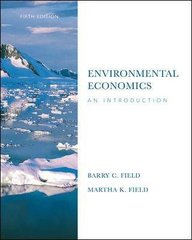Question
Analysis of chapters 1-8, 12-13, and the epilogue of the book Naked Economics, by Charles Wheelan, focusing on (but not solely just answering) the questions
Analysis of chapters 1-8, 12-13, and the epilogue of the book Naked Economics, by Charles Wheelan, focusing on (but not solely just answering) the questions identified below for each chapter.
You should follow these parameters:
Each chapter analysis should begin on a new page.
Each chapter analysis should have its own title.
Use the questions as a guide to form a well-constructed analysis of each chapter. You will
need to give your personal thoughts as well.
Avoid using direct quotes from the text; interpret the concept in yourwords.
You may use in-text citations (using only a page number) to make references to specific
information from the book. Your objective is to be brief but also descriptive!
Chapter 1: The Power of Markets
o What are the two basic assumptions economists make about individuals and firms?
o What example does the author give to back up his statement that "maximizing utility is
not synonymous with acting selfishly"?
o What is the role and significance of prices in a market economy?
o What are the advantages and disadvantages of a market economy?
Chapter 2: Incentives Matter
o Explain how each of the following relates to efficient outcomes in a market economy:
Adverse selection
Perverse incentives
Principal-agent problem Prisoner's dilemma
o How does the author back up his assertion that government benefits create perverse incentives?
Chapter 3: Government and the Economy
o Explain externality in yourwords
o What roles do governments play in a market economy?
Chapter 4: Government and the Economy II
o What are the reasons why the government should take a limited role in a market
economy?
Chapter 5: Economics of Information
o How does the author use the example of the HOPE scholarships to explain the problem
of asymmetry of information?
o What does the author mean by "perfect information"?
Chapter 6: Productivity and Human Capital
o Do you agree that Bill Gates should be richer than you? Explain.
o What is "income inequality"?
o Why do economists argue that we should not care about "income inequality"?
Chapter 7: Financial Markets
o How do get rich quick schemes violate the basic principals of economics? o Do you agree with the author's rules for investment advice? Explain.
Chapter 8: The Power of Organized Interests
o Why have Mohair farmers earned a subsidy from the federal government? o What does the author mean by "in politics, the tail can wag the dog"?
o What is the economic impact of the statement in the question above?
Chapter 12: Trade and Globalization
o What is the "good news about Asian sweatshops"?
o How can free trade and the concept of specialization make all nations better off?
Chapter 13: Development Economics
o Based on your reading or experience, what do you believe are the two biggest
obstacles preventing poor countries from becoming rich?
Epilogue: Life in 2050
o What are three economic questions you have about life in 2050?
Step by Step Solution
There are 3 Steps involved in it
Step: 1

Get Instant Access to Expert-Tailored Solutions
See step-by-step solutions with expert insights and AI powered tools for academic success
Step: 2

Step: 3

Ace Your Homework with AI
Get the answers you need in no time with our AI-driven, step-by-step assistance
Get Started


